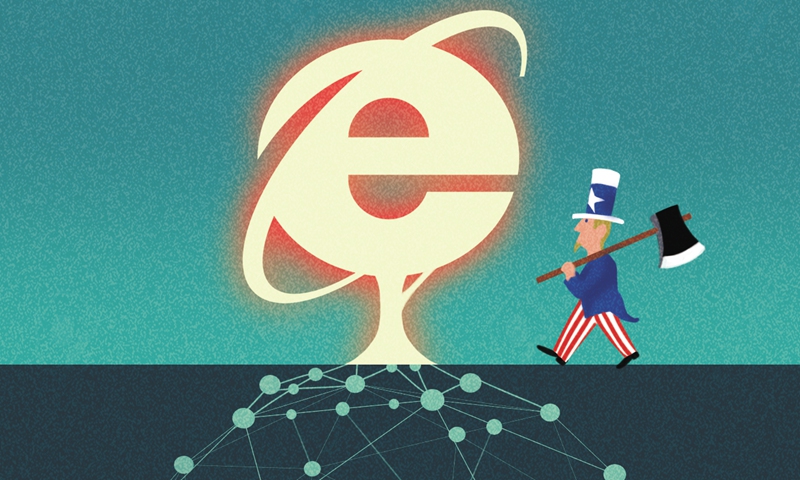Washington inflames cyber-Balkanization and splinternet with politicized moves
By Jia Kai Source: Global Times Published: 2020/8/11 18:38:40

Photo: Liu Rui
After US Secretary of State Mike Pompeo announced the Clean Network program aiming to limit Chinese internet companies' operation in the US on August 5, Trump signed orders on Thursday banning US business with TikTok's parent company ByteDance and Tencent's WeChat. These moves have heated up concerns over cyber-Balkanization.
The operation of the internet depends on the coordination of infrastructure like cables, protocol suites, and actual applications in people's daily lives. The main goal of internet governance is to keep the coordination of these three divisions. Although there are differences among countries in regard of standards and management of infrastructure and protocol suites, a generally mature governance system has been formed.
In comparison, the governance of actual applications is deeply disputed due to differences in political and economic systems. The commercialization of the internet accelerated in the 1990s. As a result, the internet has become increasingly influential to human society. The challenge people face with internet governance has thus turned from physical and protocol tiers to actual applications. Since then, arguments have become fiercer about internet applications' impact on civil rights and public security.
Different countries have varied understandings and systems over data rights, as well as distinct supervision and law enforcement protocols. This objectively determines the inevitability of international disputes.
However, different systems will not necessarily result in a "splinternet". Be it the 2000 US-EU Safe Harbor Framework or the Data Free Flow with Trust declared in the 2019 G20 summit in Japan, the international community insists on consensus-based global cooperation with institutional innovation. This has also become an inevitable choice and trend for the international community to resolve conflicts in cyberspace.
Measures taken by the Trump administration in recent months to restrict certain companies or "clean" the internet under the pretext of protecting personal privacy and national security cannot help solve problems. Instead, they could severely divide the international internet. The internet is a globally interconnected network. That's where its core and vitality comes from. The international community has a consensus and common interest to maintain the global internet - especially the consistency of the three levels to the internet. After the US announced its "Clean Network" program, the Internet Society issued a statement expressing its disappointment and accused these US policies of fracturing the internet into pieces.
As the birthplace of internet, American society is supposed to have a deeper understanding of the open internet. Restricting the development of technology or the industry through governmental means will not succeed. The export of cryptographic technology and devices from the US was once severely restricted by Washington. But as the rapid development of the internet industry promoted the popularization and application of cryptographic technology and the use of open-source software made the administrative restrictions a mere formality, the US government was forced to ease the ban.
The history of international internet cooperation has also proven that institutional differences are not the root cause for the breakdown of cyberspace. Relevant enterprises should become adept at taking legal weapons to fight the US ban to protect their legitimate rights and interests. Relevant industry associations should also play a role in maintaining the openness and stability of the internet industry.
It's not only necessary but also possible for all countries to understand each other's demands through dialogue and negotiation on the premise of respecting institutional differences. This can achieve reciprocal and mutual benefits with win-win international governance mechanisms. The internet community needs an open, cooperative, fair and just internet. Isolation and confrontation do not harness the potential and hopes of internet development.
The author is lecturer with the School of Public Affairs and Administration, University of Electronic Science and Technology of China. opinion@globaltimes.com.cn
RELATED ARTICLES:
Posted in: VIEWPOINT